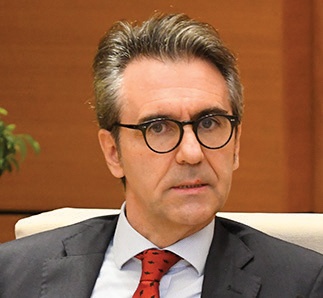Transforming energy in the race against climate change
 |
| Vietnam has acknowledged the global energy transition, but EU countries are leading in green growth, Photo: Shutterstock |
Sven Ernedal came to Vietnam in 2018 to work in his position as the project manager for GIZ Vietnam’s Renewable Energy and Energy Efficiency Programme. At that time, renewable energy development stood at a different stage as it does now, with the proportion of renewable energy in the overall structure being almost negligible and identified as a field with many barriers to further development.
The energy transformation – part of Ernedal’s work – in Vietnam was then promoted with the explosion of solar and wind power sources, with the greatest concentration in the south-central provinces of Ninh Thuan and Binh Thuan, thanks to the established 20-year feed-in tariff (FiT) price guarantee.
GIZ data showed that, by early 2021, solar power accounted for more than a quarter of the nearly 70GW of total national power capacity, while wind energy had an installed capacity of 533MW at that time.
However, Ernedal witnessed the shift from fossil to renewable energy slow down, as the Ministry of Industry and Trade (MoIT) stopped applying the FiT mechanism for solar and wind power at the end of 2021. “Additionally, the uneven development of these energy sources, focusing primarily on the south of Vietnam, posed a huge challenge to the balance of the national power system,” as Ernedal described.
“Energy transition means more than replacing one energy source with another. It is also important to reduce greenhouse gas (GHG) emissions in the energy sector, which account for a large share of total emissions in Vietnam,” Ernedal said.
Currently, the government is reviewing and editing the Power Development Plan VIII (PDP8) for the period up until 2030, with a vision to 2045, based on the forecasts of electricity demand and the scale of electricity generation and grid expansion in the future. Vietnam’s per capita electricity consumption has increased from 253kWh per person per year in 1999 to 1981kWh per person per year in 2018, an 8-fold increase within 20 years.
The forecast of the Energy Institute under the MoIT indicates that the electricity demand will increase to 491.3TWh in 2030 and 877.1TWh in 2045, more than twice and four times as high as in 2020, respectively. The demand is especially forecast to increase rapidly in the north and south of the country, with each accounting for about 45 per cent of the total national electricity demand by 2030, while the central region is expected to account for a modest 10 per cent.
Since 2017, the term “energy transition” has been widely used in Vietnam, emphasising the negative impacts of coal-fired power and advocating for the development of renewable energy and its efficient use. However, the updated PDP8 draft so far did not set out objectives and investment proposals to move Vietnam’s power sector towards net zero emissions and achieve economic and environmental co-benefits.
Emissions from the power sector are expected to continue to increase until 2045 and the persistent high emission trend is at odds with Vietnam’s commitment to achieving the ambitious target formulated at COP26. Many analysts remain concerned that Vietnam will continue to depend on the international market, be vulnerable to geopolitical issues, and continue to be an energy-inefficient economy.
GIZ analysis warned that Vietnam can remain a country that heavily depends on coal-fired power, leaving it severely vulnerable to climate change despite the change in power source structure over the recent years. The draft PDP8 estimates that coal demand for power generation will increase steadily from around 37.4 million tonnes in 2020 to 86.4 million tonnes in 2030, and about 114 million tonnes around 2040-2045.
Vietnam’s long-term projections for emissions from the power sector do not suggest that GHG emissions will peak in 2030 and reduce emissions towards carbon neutrality. The government issued the National Adaptation Plan, updated with emission reduction targets by 2030, but has not made a decision on when to become carbon neutral, as the EU has claimed.
Rainer Emschermann, external affairs officer of the Directorate-General for Climate Action under the European Commission (EC), in a webinar on April 21, said that there are many solutions being offered by the EC to solve the difficulties and challenges of Vietnam. He cited the fact that Europe leads many countries to implement green growth solutions, build a circular economy, behave in accordance with the environment, and change awareness and consumption towards a green way of life.
“At the moment, the EC is strongly pushing for implementation of the green deal programme – a set of policy initiatives launched by the EC with the aim of making Europe climate neutral by 2050. Europe’s target is to reduce net GHGs by at least 55 per cent by 2030, compared to 1990 levels,” explained Emschermann.
| Giorgio Aliberti - EU Ambassador to Vietnam
The EU’s green deal solutions are similar to Vietnam’s green growth goal. But the financial challenge is huge, for Vietnam and the EU, because this process requires huge funds. Vietnam may need half of that funding from the private sector. Attracting private resources also involves another set of challenges, such as policies, techniques, and procedures. So, transparent policies and predictable mechanisms are required. Only when Vietnam creates an open environment will it be possible to attract foreign and domestic investors to participate in this process, contributing to bringing benefits to the Vietnamese economy and people. Nguyen Phuong Mai - Deputy chief of office Electricity and Renewable Energy Department Ministry of Industry and Trade
The EU is one of the leading partners with strong commitments and actions on combating climate change, and has supported Vietnam in its energy transition. The Electricity and Renewable Energy Department will use the green deal as an effective reference, thereby building appropriate policy mechanisms and facilitating the development of renewable energy. It is also a premise for Vietnam to implement a pilot project and introduce a new mechanism for tech and innovation in renewable energy, thereby accelerating commercialisation of energy sources. We hope the EU will continue to support Vietnam in terms of resources and techniques, helping Vietnam achieve its emissions targets. Duong Quang Thanh - Chairman of the Members’ Council Electricity of Vietnam (EVN)
European partners are actively cooperating and supporting EVN to play the leading role in the energy industry and contribute to the national energy transition to realise the net zero target. EVN has signed a preferential loan deal worth $84 million with the French Development Agency, without a government guarantee, to strengthen the southern power grid system and free up capacity for developing renewable energy sources. EVN commits to direct the Southern Power Corporation to meet the objectives and use the loan capital effectively. EVN hopes to continue receiving support from the EU in the development of electricity grids, transmission, and distribution, in line with the government’s energy transition goals. |
What the stars mean:
★ Poor ★ ★ Promising ★★★ Good ★★★★ Very good ★★★★★ Exceptional
Related Contents
Latest News
More News
- Bac Ai Pumped Storage Hydropower Plant to enter peak construction phase (January 27, 2026 | 08:00)
- ASEAN could scale up sustainable aviation fuel by 2050 (January 24, 2026 | 10:19)
- 64,000 hectares of sea allocated for offshore wind surveys (January 22, 2026 | 20:23)
- EVN secures financing for Quang Trach II LNG power plant (January 17, 2026 | 15:55)
- PC1 teams up with DENZAI on regional wind projects (January 16, 2026 | 21:18)
- Innovation and ESG practices drive green transition in the digital era (January 16, 2026 | 16:51)
- Bac Ai hydropower works stay on track despite holiday period (January 16, 2026 | 16:19)
- Fugro extends MoU with PTSC G&S to support offshore wind growth (January 14, 2026 | 15:59)
- Pacifico Energy starts commercial operations at Sunpro Wind Farm in Mekong Delta (January 12, 2026 | 14:01)
- Honda launches electric two-wheeler, expands charging infrastructure (January 12, 2026 | 14:00)




 Tag:
Tag:




















 Mobile Version
Mobile Version